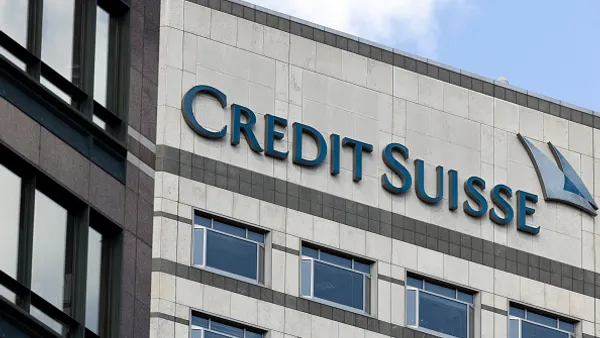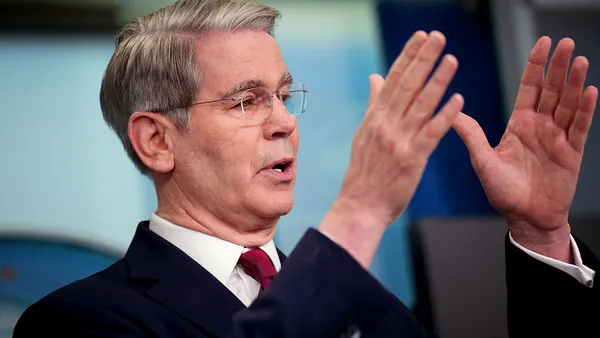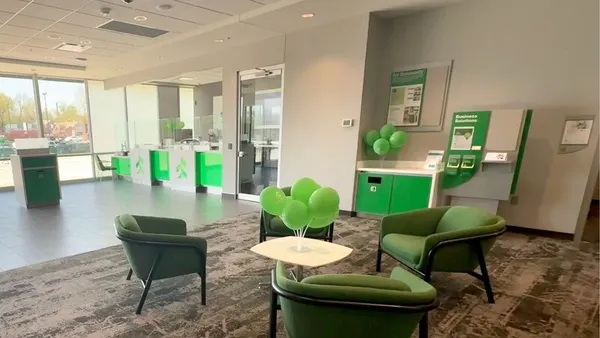The coronavirus pandemic has pushed financial institutions to implement new processes and policies as they navigate a socially distant environment.
One tool that has allowed banks to practice social distancing while still maintaining the person-to-person experience is the ability to schedule appointments with customers.
The practice is one that some bankers say might remain after the pandemic subsides as new customer habits take hold.
"Appointment setting is going to be important," Stephen Griffin, senior vice president at Regions Bank, said during a webinar Thursday hosted by Future Branches. "It’s going to be a priority for us as well as the digital channels going forward."
The Birmingham, Alabama-based bank, which has 1,456 branches across 15 states, has closed its branch lobbies to walk-in traffic during the pandemic and has kept its drive-throughs open. The bank allows customers to visit its branches by appointment only to manage capacity levels.
While the practice is meant to keep customers and employees safe amid the pandemic, Griffin said customers will begin to realize the practical reasons for arranging a designated time to meet with a banker.
"A lot of folks are working from home. That's going to be a new normal for a lot of people," Griffin said. "You're in the house, you're working from home, and you're juggling quite a few different things as you go through the day. Appointment setting really helps you plan your day out a bit better."
Allowing customers to schedule appointments can also help a branch with its own planning and operations, said Jean-Pierre Lacroix, president at design agency Shikatani Lacroix Design, a company that develops strategy for Regions Bank.
"Having appointment setting allows you to triage customers, manage the staff levels in the branch and then decide which of those engagements can be moved to a virtual, online or digital platform," he said. "It actually allows the banks to have better efficiencies, during COVID and post COVID."
As customers practice social distancing amid the pandemic, banks have reported spikes in usage of their digital channels.
New mobile banking registrations jumped 200% in early April, according to a study by Fidelity National Information Services, which works with 50 of the world's largest banks. Mobile banking traffic also rose 85% during the same period.
A study conducted last week by customer experience platform Lightico found 77% of consumers prefer not to visit their bank branch amid the pandemic.
Despite customers increasingly turning to digital options and purposely avoiding in-person visits to the branch, digital is not for everyone, said Steve Connolly, senior director of product management at TimeTrade, an appointment scheduling software company that counts Regions among its clients.
"There's still a fair amount of holdouts out there that don't want to bank digitally," he said. "Even if you've got online banking, you really want to try to consider incorporating the appointment mechanism. Oftentimes, someone's journey goes from doing something online to check balances, but they still need to talk to somebody about something. It's great if you've got online chatbots built into your application, but even better still, if you extend that into an appointment to reserve time."
Phone appointments are an alternative to digital banking that can be done remotely but also allow for the personal touch, Connolly said.
"You don't have to go to an advanced technological solution to satisfy the need at times. Phone appointments give people that engagement that they're looking for, a friendly voice on the end of the line," he said. "You're getting your customers what they need without a heavy investment in perhaps virtual technologies, or other capabilities that still require a bit of technical due diligence."
Regions has seen a 72% increase in appointment volume from February to April, including a 350% increase in new account openings, Connolly said, citing TimeTrade’s internal analytics.
"Things slowed right at the beginning of all this, but now we're starting to see the tick-up in the account openings again," Griffin said. "Customers are starting to do a lot more than they were doing before, and appointment setting has been a very big piece of that, allowing us to execute those transactions."













